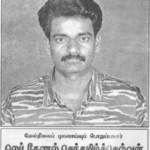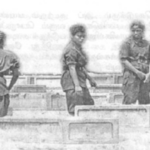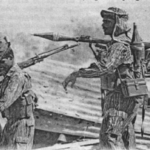

He has a lot to achieve – Senthamilchelvan
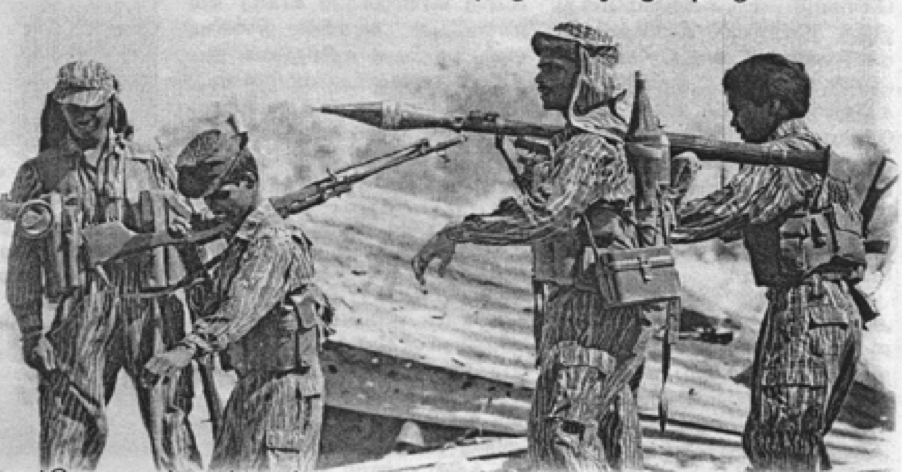
It is not only water but also bravery that springs from the mud stones in the soil of Jaffna. If it wasn’t for war times, it would have provided water and cooling to the aggressive Sinhala and Indian occupiers. I see Lt. Col. Senthamilchelvan with a palm tree that breaks the seed and splits the soil, gathers all the strength in the soil and tears the air, striving to touch the sun.
In 1990, Tamil Eelam was freed from the grip of the Indian occupation forces and came back under the control of the LTTE. Karan, whose real name is Prabhakaran (later given the alias Senthamilchelvan), was the first person who sprung to mind to Kunam when asked if there are any protentional people to act as agents for the Jaffna district intelligence operations. Kunam’s quickly reached the Vadali enclosure of Pandatharippu where Karan lived on his Motorbike. Karan had just returned that day from seeing his father in Colombo, so visibly tired.
“The Intelligence Team needs people – can you work part-time?” Kunam asked bluntly. After a few minutes of silence, Karan responded, “I don’t agree with working part time for liberation, my brother joined long before me, if I am doing this, I am doing it whole heartedly”. Kunam didn’t expect his unflinchingly clear answer. Neelavannan, Karan’s younger brother, was one of the three brothers who was already fully involved in the struggle. Kunam being soft hearted, did not have the courage to ask Karan to be a full- time fighter without the support of his mother and elder sister.
The family of Sivapakyanathan Rasamani, Karan’s parents, lived in a small village in Pandatharippu. Much like the village, the family does not bear the scars of the war and were not much involved with the liberation war. However, shortly after Kunam’s story, on 13.09.1991, rising to the name, Senthamilchelvan took the first step to travel the path of liberation by fully joining the LTTE organization.
The knowledge, love and prosperity in the name of Senthamilchelvan were all for him. You can understand the character of a Lion by looking at it, but unlike that, he resembled the characteristics of an Elephant; peace, beauty, depth and valour are all. Due to the complex layers of his character, some people found it difficult to understand him.

The “DAVID-01” Training Camp symbolized the growing crop. Amin, the training teacher, will examine the memory of the training fighters by asking them to write on a paper different useful item of various hues. Everyone starts writing, but abruptly he will command “Put down the Pens and run!”. Once everyone starts running, naturally they forget everything in mind. Senthamilchelvan would be the only one to without fail remember each item in these exercises. His drive to ‘win or perform’ will earn him more credit. Senthamilchelvan was one of the fifteen fighters selected for special duty from the training camp.
Senthamilchelvan studied at Vattukkottai Hindu College but did not complete his higher-level education. For positions in intelligence services, one would normally need to have a solid foundation and credibility to their education. For Senthamilchelvan, he just had a knack for this line of work, more so a natural in the field. Nallur, Pasaiyur and Gurunagar were the fields for his initial investigations.
Around 1994 the liberation war started gaining more momentum. His office work was his life and he took great pride in his work. He would work on organised investigative work to break the arms of neighbouring
traitors who dared to betray its roots. Even a small piece of information can throw a big knot in an investigation. Fake information creates knots and dangers without being seen – whether a swan can tell the difference between milk and water, the investigator must be able to tell the difference between truth and lies.
From the point of view of his Senior Intelligence Officer, ‘The history of the best investigator is the
information & documents he has collected & analysed; the support he has for the liberation war and the development of Tamil Eelam.’ Intelligence work must come with far-sightedness and can be useful even after the passage of time. His Senior comrades remembers how important his work was and how he worked around the clock.
(Couldn’t divulge because it’s confidential)
If the assigned work is not completed, when arriving to the camp, he would stop the engine of his motorbike five hundred meters away and would roll it noiselessly, comes to the camp, completes his work, rolls it again five hundred meters away and starts the bike from there. He did this not entirely because of his guilt for not finishing the work, but more so to be inconspicuous until the work was done.
One day, the commander, as a way of testing across the board the readiness of the intelligence members said, ‘Brothers, raise your hands, who is willing to go to the battlefield?’. The commander was conscious of knowing if any of the intelligence members were bored with investigative work. Hesitantly, Senthamilchelvan looked up and raised his hands. As per procedure, whoever raised their hands will be
taken into the practice of intense field training. They intentionally put the members through intense training so members can see the grass is actually greener on the other end. When the return to office, not only do they come back with the knowledge and skill of field training, they have a deeper drive to succeed in their work.
On 10.03.95, when he went to see the bodies of the LTTE members who had died in the Sinhalese Operation “Battle Thunderstorm”, which was once again aimed at occupying Jaffna, he came across his younger brother Lt. Neelavannan who also died in this battle. Lt. Neelavannan was the youngest of the brothers, the one to be carried on the hip of Senthamilchelvan as a child but today he was carried on his shoulders. This is the unfortunate circumstances of War.
During 1996-1997, the Sinhalese leadership dreamed of a Tiger-free Jaffna and occupied it. It was a time when a barricade was erected around the cramped area, two army bases were set up at the junction, and a Sinhalese soldier was left to guard each corner. The expansion and concentration of the Jaffna Peninsula was very advantageous for the Sinhalese army in terms of defence.
As our Honourable Leader Prabhakaran says, “In any strength there will be no weakness!” The aggressive attitude of the Sinhalese leadership underestimated the liberation fighters who said, “We will break through even if they reinforced it with all their strength”. He was the first in the intelligence team prepared to be the people with the people, their sons, as attackers with pistols only when the need arose,
when it was too risky to engage in operations, in Jaffna as a guerilla warrior. He went to Mullaitivu for training as an intelligence officer to investigate every street and order in the soil where he was born and bred.
The training of a Black Tigers was so intense, learning to beat the enemy with your bare hands and snatching their gun, the training of patiently hiding while forgetting food and sleep, all this with just a day of rest in between. During the time of Senthamilchelvan’s training, Anbu Master, a trainer at the camp was riding along with Senthamilchelvan on his motorbike. Whilst they were making their journey, they made several stops in different places. Senthamilchelvan noticed the petrol was running out on the motorbike. He stopped the bike and asked Anbu Master to get off the bike politely. “We are running out of Petrol, if you don’t mind can you wait here and I’ll sort this out”. Senthamilchelvan disappears momentarily and comes back to pick Anbu Master up. “Where did you get Petrol from out here?” Senthamilchelvan responds and in summary says he has friends in many places, but he cannot let the identity of these people to be known to anyone, for their safety as well as his own. This was a core memory for Anbu Master and he immediately thought to himself, “Its moments like this a student becomes the teacher”.
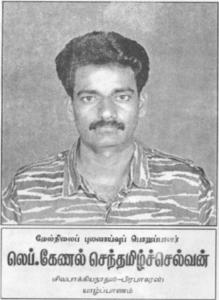 If you are traveling to the Jaffna peninsula from a stones throws distance, you have to use any lake route. The trip will continue with the help of small streams known as ‘Gulla’. The weather change can cause the Lake currents to run wilder at times otherwise smooth current. The stream moves through the gusty winds and tears through the darkness. That was the journey they had to make. “Brother, let us down when the water reaches waist level. Wait for us till we get on to dry land, if the Army starts firing, we will try to escape anyway and if you hear any explosions, tell the boys on the ground that we are safe”. Their journey continues and they wait for news. Focus Light of the Sinhalese Forces illuminates the lake surface. They hide in the water with only their eyes visible. ‘Kavati’, a sea creature that can be found in
If you are traveling to the Jaffna peninsula from a stones throws distance, you have to use any lake route. The trip will continue with the help of small streams known as ‘Gulla’. The weather change can cause the Lake currents to run wilder at times otherwise smooth current. The stream moves through the gusty winds and tears through the darkness. That was the journey they had to make. “Brother, let us down when the water reaches waist level. Wait for us till we get on to dry land, if the Army starts firing, we will try to escape anyway and if you hear any explosions, tell the boys on the ground that we are safe”. Their journey continues and they wait for news. Focus Light of the Sinhalese Forces illuminates the lake surface. They hide in the water with only their eyes visible. ‘Kavati’, a sea creature that can be found in
the lakes of the peninsula, extends like a sharp knife and when it cuts human flesh, especially when soft from feet submerged in water for long periods, the victim wouldn’t feel it until they see their feet bleed out. Given the darkness, given the circumstances of battle, imminent danger, it made a simple lake crossing task a lot more difficult. Sri Lankan Government forces began firing shots to alert the rest of their soldiers that something strange is lurking in the waters. The boatman that had dropped the LTTE members came back in the direction of the gun fire to retrieve the team. They camped out the night. Being resilient, they attempted the next night to which they led the operation to success.
Senthamilchelvan went to Valikamam with Lt. Col. Sivanesan, but could not find a specific supporter’s house in Kondavill, where he was supposed to spend the night. The dogs started barking. Who would open the door in the occupied territory at that time of the night? To knock on the door of two different
houses where there was uncertainty to who would answer was already dangerous. Realising the risk of essentially knocking on strangers’ doors and walking around at that time of the night, they chose to sleep in front of somebody’s house to prevent drawing themselves attention. To the surprise of the home owners, in the morning they met and greeted the pair. The home owners were even more nervous once they introduced themselves. At this point, they decided not to ask for help to get directions to the supporter’s house as it was looking a little problematic. Once he found the supporter codenamed ‘Rosapoo’ at a junction in Kondavill, they were taken to his makeshift home with the shocking news, “Oh by God’s Grace, you are lucky, my house has been broken into and taken over by the Sri Lankan Army”.
The next day, Sivanesan, taking Senthamilchelvan on his bike stopped at a junction abruptly, ‘Soldiers!’, he suddenly turned the bike back. Senthamilchelvan said, ‘We have come to work with the people as ordinary people. If Army stops them for their identity card, show it and tactfully escape.’ In fact, to their dismay, nothing happened that day. Funnily enough the army spies became his friends.
Offensive action is more of a secondary approach for his work. The houses where secret operatives stay and work became almost like real family homes to these spies. In the eyes of intelligence operatives, in the eyes of neighbours, in order not to fall into the eyes of suspicious government forces, Senthamilchelvan lived up to high standards with his investigative activities. His work created people like, Sivanesan, Emerson, Shivam and Sundar in the Valigamam area. This led to the stabilization of many secret operative members.
As the operations continued, the message ‘come to Vanni’ reached Senthamilchelvan from the command office. ‘A swift attack must be made before going to Vanni, a good target must be chosen’. The first attempt for the operation was not successful.
On another attempt, the team chose another target, unfortunately this also led to failure as the targeted individual for the particular operation didn’t show up. This operation was going to be carried out with Claymour. There was many dangers behind the preparation to these operations, so it is true that the failure of the efforts, despite the dangers, broke Senthamilchelvan’s heart.
The day came to go to Vanni. He didn’t expect his commander to say that ‘efforts are the stepping stones to success’. With this echoing in his mind, he makes way by boat to Vanni, reminiscing and looking to overcome his shortcomings. He met his most adored idol, the leader himself. He took photos to mark the special gathering. Jaffna welcomes him back as the Jaffna Internal Intelligence Command with new orders, new operations and with even more boldness and confidence.
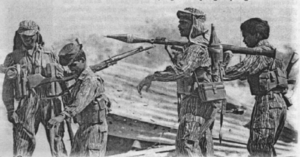
In early 1999, the leadership’s decision that ‘destroying the informants and supporting mercenaries of the Sri Lankan Military Intelligence and blocking their movement, would lead to easing the activities of the militants in Jaffna soil’ brought Senthamilchelvan into action. It was on a Sunday, ‘Two Singhalese spies used to congregate in a shop in Jaffna and a comrade with a handgun was tasked to take them out. The targets had not arrived. It had hit 10am, taking into account the danger of continuing to walk up and down on that road, we went to shelter. Again at 4pm the operation resumed. By 7pm, the targets had still not shown up and at this point we suspended the operation. While Senthamilchelvan was pedalling his bike home, on Kasthuriyar Street in Jaffna,
Senthamilchelvan noticed slightly ahead of him on a bike someone who resembled the Jaffna District Handler for a group of mercenaries working for Sri Lankan Military Intelligence. The street light gave clarity and confirmed the targets identity. ‘An accidental encounter with a valuable target rather than the sort out target, is still a win’ and his two-barrelled gun never misses the mark.
Another day, he had completed all the information about the target that was to be destroyed and the target that had been closely cooperating with the soldiers in betraying the Tamil Tiger Members in Nallur Pradesh. He rode his bike to the door of the target with a fellow fighter, armed with a pistol. He called the target by name, the target turns to them with guilt, a feeling of disgust in himself, ‘I am not of this name’ he responded. Treason was denied as usual. Similarly, the target met his end by the hands of Senthamilchelvan.
On 06.06.1999, another member of the LTTE, who had completed training for a special operation, was brought from Vanni to Jaffna across the saline river. Even with Senthamilchelvan’s feet torn by ‘Kavati’ in a Lake on a previous mission, he attended his next mission. He and his companion left the Pasayur beach and as they were walking nearby a maternity hospital, they heard in Sinhala, “Who’s that?!”. As the Sinhalese soldier shouted this, their guns started firing. Captain Siddharthan embraced Veerachavu (Heroes Death), whilst Senthamilchelvan escaped. In a hidden place unknown to anyone, he was being well fed and looked after for the night. The following day he took leave from his place of refuge and was back at his next mission.
The next day, he reached the home of a woman who had once embraced him and kept him as a child of her house. She said, “There are wounds and thorn scratches on my child’s legs. I have been sick for four to five days. The child was tired. During the night, my husband and I applied medicine to the leg and applied oil for his full recovery”.
On the 18.06.1999, though he was normally closer with the mother of the household he was seeking refuge with, he approached the father of the household. “He held my hands and said ‘Dad, give this thousand rupees to some orphanage, it’s my birthday today’. I told him I can do this and offered to give a receipt once done but he responded, ‘What? Do you think I have no faith in you?’ I was amazed at his maturity at the age of 29”. This is what the father said looking into the troubled eyes of his wife.
Though the grief of losing his friend half way pierced his heart like an arrow, he acted like an arrow in his path and target.
‘Two Sinhalese Army Intelligence officials are coming to the house of a Teacher on Srinivasan Road in Jaffna Kottadi’ is the information given by the freedom fighter known as “Pootu”. One night at seven o’clock in the evening, he went in search for the two intelligence officials with a fellow fighter. Senthamilchelvan and his comrade find the targets. The targets were stood joking around in casual conversation, not knowing they brought attention to themselves. One was taken out instantly by his Gun, the other target tried to escape. In the frenzy, Senthamilchelvan kept his cool, aimed at the runner and hurled his hand grenade to finish the job.
Senthamilchelvan came home in high spirits and says to his guardians, ‘Mum, leave your rice today and make something good!’, his guardians were also absorbed in the success of the attack unknowingly by Senthamilchelvan’s giddy mood.
On 04.09.1999, knowing that mother had sprained her leg and was sick, he got up early in the morning, fetched water for her toilet, filled all the dishes with water and cleaned the house. He finished all the housework and was leaving for his work. Before he left, he says “Mum, I might not come back tonight, but don’t worry I will stay at my Aunt’s house.” Even though the mother knew there was no “Aunts House” she didn’t question it. The mother is also strict about maintaining secrecy. As usual, she stood at the door and watched him wave as he left. ‘He waved his hand till he disappeared from my sight into the distance’. She was reminded of her own Son who had given his life for the LTTE movement, who had once left the home waving similarly to Senthamilchelvan.
On 05.09.1999, at eleven o’clock in the morning, Nallur Murugan Temple Street was full of people, rickshaws carrying girlfriends, rickshaws carrying wives, cars carrying families. His rickshaw and fellow fighters’ rickshaws passed by in different directions.
When he tried to cross Nallur Arasadi Road (Near the Bharathi Monument) on his bicycle, a Sinhalese soldier standing near the checkpost intercepted him and grabbed his hands. Senthamilchelvan threw him and rushed into the Sinhalese soldier with the aim of snatching the gun to counter strike. After realising his efforts were going to lead to failure and seeing his was outnumbered and unarmed to armed officers, he accepted his fate and bit into his Cyanide capsule.
The news of the body of the young man in Black Junes, Gray top and Green underwear shocked the mother. ‘The clothes are his’, the father and mother whispered. His guardian mother could not see his body in the hospital. The Mother would not be able to not weep at the body. If you cry like that, you may catch the eyes of Sinhalese Military Investigators. The Mother never went to the hospital as she had another fighter under her wing and if anything happened to arouse the Government Forces suspicion, it would only jeopardise his life.
As the Mother had thought, although the soldiers had seized his bicycle and identity cards, they could not locate her house.
‘The selfless and detached life of a freedom fighter is noble and meaningful. He dares to sacrifice his life for the noble ideal of freedom’.
Senior Investigation Officer
– Lt. Col. Senthamilchelvan —
Sivapakyanathan – Prabhakaran ̃ Jaffna
Commemoration – C. Madula LTTE magazine
Karthigai, 2003
